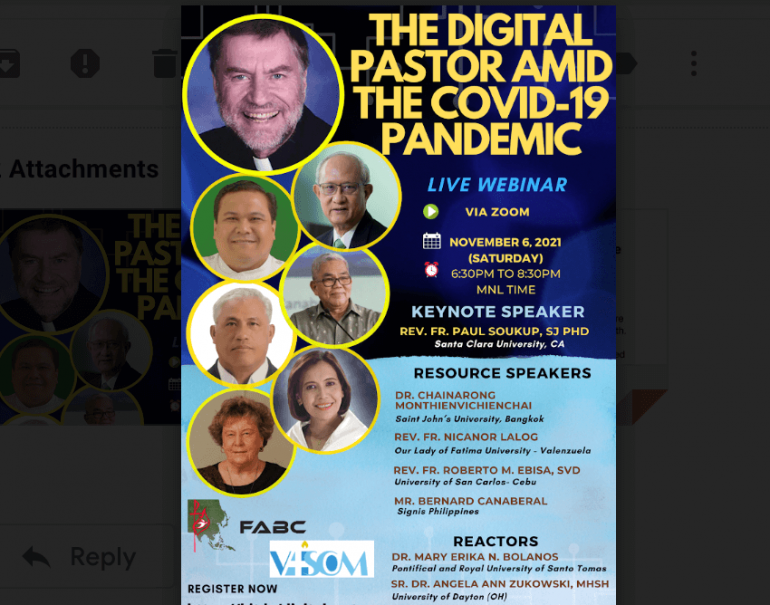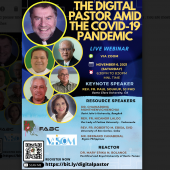Find “new ways of being Church” in the age of pandemic and social media --- experts

The Church needs pastors able to provide a deeper and energizing sense of the faith.
Sr. Angela Ann Zukowski, missionary helper of the Sacred Heart, said this at the live webinar entitled “The Digital Pastor Amid the COVID-19 Pandemic” November 6.
More than providing content, the Church’s response to the COVID-19 crisis should be one that builds a sense of “community,” the director of Dayton University’s Institute of Pastoral Initiatives said.
Technology savvy youth and the advanced-in-age “wisdom” groups should come together to discover new ways of “being Church” in “this new missionary context,” Zukowski added.
Meanwhile, Jesuit Fr. Paul Soukup of Santa Clara University said digital pastors should be open to ideas and be willing to listen, especially to the people they serve.
Technological competencies as well as solid grounding on doctrine are needed. But pastors must also “test and try” what could work in terms of pastoring and providing care online.
In his keynote address, the communications consultant of the United States Catholic Conference of Bishops (USCCB) said that nurturing faith, particularly in crisis situations, is important.
Digital pastors should then offer creative inputs for the “senses” like hearing because the same inputs will evolve into stories of one's experience of God.
People’s identities take shape through socialization, Soukup said, and this makes the digital pastor’s role all the more crucial in forming and nurturing faith.
During the pandemic, the yearning for the Divine and the sacred was felt even stronger. This spurred initiatives like Online Masses that aim to bring the experience of Church back to the people.
Social media personality Fr. Nicanor Lalog did this in Malolos diocese, where he serves as social communication director.
With the Holy Spirit’s guidance, the priest has initiated “Libot” (move around), processing the Crucifix and Blessed Sacrament in a motorcade, along with “Walk through” and “Drive through” Holy Communions.
On such occasions, the Gospel message permeates people’s realities.
The head of Signis-Philippines, Bernard Canaberal, said that Church media should broadcast content mirroring people’s felt needs and situations.
SImilar to the universal Church, Signis, the World Catholic Association for Communication, is also critically adopting new media technologies while doing its mission under the “love shared and truth told” motto, Canaberal added.
Speaking on the enduring power of radio, Divine Word Fr. Roberto Ebisa said the medium was able to converge with newer media platforms.
Programs of the SVD-run DYRF station where the priest works as consultant were thus streamed on Facebook live.
The University of San Carlos Professor added that through live broadcasts of Holy Mass, radio has fostered the Filipino identity that is close, if not akin, to the celebration of Holy Eucharist.
To Senior High School Principal Mary Erika Bolanos, “being Church” in the age of pandemic and social media then goes beyond the institution or the building.
It is looking after people’s welfare and bringing them closer to God, the professor of University of Santo Tomas said.
Skill is needed to carve a digital presence but even more so, digital pastors should possess an identity that is shaped by encounters with the Good Shepherd Himself.
Moving on to a post-pandemic era, Dr. Chainarong Monthienvichienchai said that priests should be able to bring all their learnings during the COVID-19 crisis.
We should continue using “the wonders of modern technology in our synodal Church,” the Chancellor of Saint John’s University said, because this will result in an even “deeper communion for our mission in the world.”
Present at the webinar are some 180 clergy, religious educators and social communication directors from about a dozen countries including India, Mongolia, Myanmar, and Southern Sudan.
The event also saw the social communication Chairman of the Philippine Catholic Bishops’ Conference, Bishop Marcelino Maralit, and FABC-OSC Chairman, Bishop Roberto Mallari.
Former FABC-OSC Chairman, Bishop Chacko Thottumarickal, SVD, was also present.
The event was organized by the Office of Social Communication of the Federation of Asian Bishops’ Conferences (FABC-OSC) and Veritas Asia Institute of Social Communication (VAISCOM).
Guests included the Apostolic Vicar of Taytay, Bishop Broderick Pabillo, and the Apostolic Prefect of Ulaanbataar, Father Giorgio Marengo, IMC.
Radio Veritas Asia (RVA), a media platform of the Catholic Church, aims to share Christ. RVA started in 1969 as a continental Catholic radio station to serve Asian countries in their respective local language, thus earning the tag “the Voice of Asian Christianity.” Responding to the emerging context, RVA embraced media platforms to connect with the global Asian audience via its 21 language websites and various social media platforms.












